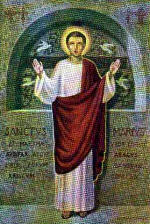13. And he went forth again by the sea side; and all the multitude resorted unto him, and he taught them.
14. And as he passed by, he saw Levi the son of Alphaeus sitting at the receipt of custom, and said unto him, Follow me. And he arose and followed him.
15. And it came to pass, that as Jesus sat at meat in his house, many Publicans and sinners sat also together with Jesus and his disciples; for there were many, and they followed him.
16. And when the Scribes and Pharisees saw him eat with Publicans and sinners, they said unto his disciples, How is it that he eats and drinks with Publicans and sinners?
17. When Jesus heard it, he said unto them, They that are whole have no need of the physician, but they that are sick: I came not to call the righteous, but sinners to repentance.
BEDE; After that the Lord taught at Capernaum, He went to the sea, that He might not only set in order the life of men in towns, but also might preach the Gospel of the kingdom to those who dwelt near the sea, and might teach them to despise the restless motions of those things which pass away like the waves of the sea, and to overcome them by the firmness of faith; wherefore it is said, And he went forth again to the sea, and all the multitude, &c.
THEOPHYL. Or else, after the miracle, He goes to the sea, as if wishing to be alone, but the crowd runs to Him again, that you might learn, that the more you fly from glory, the more she herself pursues you; but if you follow her, she will fly from you. The Lord passing on from thence called Matthew; wherefore there follows, And as he passed by, he saw Levi the son of Alpheus sitting, &c.
CHRYS. Now this is the same publican who is named by all the Evangelists; Matthew by Matthew; simply Levi by Luke; and Levi, the son of Alphaeus, by Mark; for he was the son of Alphaeus. And you may find persons with two names in other parts of Scripture; as Moses' father in law is sometimes called Jethro, sometimes Raguel.
BEDE; So also the same person is called Levi and Matthew; but Luke and Mark, on account of their reverence and the honor of the Evangelist, are unwilling to put the common name, while Matthew is a just accuser of himself, and calls himself Matthew and publican he wishes to show to his hearers that no one who is converted should despair of his salvation, since he himself was suddenly changed from a publican into an Apostle. But he says that he was sitting at the 'teloneum', that is, the place where the customs are looked after and administered. For 'telos' in Greek is the same as 'vectigal,' customs, in Latin.
THEOPHYL. For he sat at the receipt of custom, either, as is often done, exacting from some, or making up accounts, or doing some actions of that sort, which publicans are wont to do in their abodes, yes this man, who was raised on high from this state of life that he might leave all things and follow Christ. Wherefore it goes on, And he says to him, Follow me, &c.
BEDE; Now to follow is to imitate, and therefore in order to imitate the poverty of Christ, in the feeling of his soul even more than in outward condition, he who used to rob his neighbor's wealth, now leaves his own. And not only did he quit the gain of the customs, but he also despised the peril, which might come from the princes of this world, because he left the accounts of the customs imperfect and unsettled. For the Lord Himself, Who externally, by human language, called Him to follow, inflamed him inwardly by divine inspiration to follow Him the moment that He called him.
PSEUDO-JEROME; Thus then Levi, which means Appointed, followed from the custom-house of human affairs, the Word, Who says, He who does not quit all that he has, cannot be my disciple.
THEOPHYL. But he who used to plot against others becomes so benevolent, that he invites many persons to eat with him. Wherefore it goes on; And it came to pass, that as Jesus sat at meat in his house.
BEDE; The persons here called publicans are those who exact the public customs, or men who farm the customs of the exchequer or of republics; moreover, those also, who follow after the gain of this world by business, are called by the same name. They who had seen that the publican, converted from his sins to better things, had found a place of pardon, even for this reason themselves also do not despair of salvation. And they come to Jesus, not remaining in their former sins, as the Pharisees and Scribes complain, but in penitence, as the following words of the Evangelist show, saying, For there were many who followed him. For the Lord went to the feasts of sinners, that he might have an opportunity of teaching them, and might set before his entertainers spiritual meats, which also is carried on in mystical figures. For he who receives Christ into his inward habitation is fed with the highest delights of overflowing pleasures. Therefore the Lord enters willingly, and takes up His abode in the affection of him who has believed on Him; and this is the spiritual banquet of good works, which the rich cannot have, and on which the poor feast.
THEOPHYL. But the Pharisees blame this, making themselves pure. Whence there follows: And when the Scribes and Pharisees saw him eat, &c.
BEDE; If by the election of Matthew and calling of the publicans, the faith of the Gentiles is expressed, who formerly were intent on the gains of this world; certainly the haughtiness of the Scribes and Pharisees intimates the envy of the Jewish people, who are vexed at the salvation of the Gentiles. It goes on: When Jesus heard it, he said to them, They that are whole need not the physician, but they that are sick. The aims at the Scribes and Pharisees, who, thinking themselves righteous, refused to keep company with sinners. He calls Himself the physician, Who, by a strange mode of healing, was wounded on account of our iniquities, and by His wound we are healed. And He calls those whole and righteous, who, wishing to establish their own righteousness, are not subject to the righteousness of God. Moreover He calls those rich and sinners, who, overcome by the consciousness of their own frailty, and seeing that they cannot be justified by the Law, submit their necks to the grace of Christ by repentance. Wherefore it is added, For I came not for all the righteous, but sinners, &c.
THEOPHYL. Not indeed that they should continue sinners, but be converted to that repentance.
Catena Aurea Mark 2



 St. Canute, king of Denmark, was murdered in St. Alban's Church, Odense, July 10, 1086. The Martyrology confuses him with his nephew, St. Canute the Duke, who died on January 7, 1131, and was canonized November 8, 1169, by Pope Alexander III. St. Canute is also called Canute the holy, or Danish Knut, or Knud, Den Hellige, or Sankt Knut, or Knud.
St. Canute, king of Denmark, was murdered in St. Alban's Church, Odense, July 10, 1086. The Martyrology confuses him with his nephew, St. Canute the Duke, who died on January 7, 1131, and was canonized November 8, 1169, by Pope Alexander III. St. Canute is also called Canute the holy, or Danish Knut, or Knud, Den Hellige, or Sankt Knut, or Knud. 


